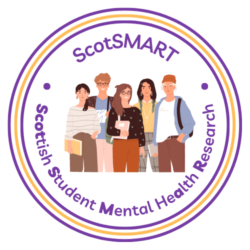With the new academic year around the corner and the start of my 3rd and final year as a PhD student at The University of Glasgow, I am reflecting on what I have learnt over the last few years in attempting to navigate managing the doctoral journey with my mental health and wellbeing.
The demands of the academic workload within a PhD journey cannot be understated. Not only are you focused on your research, collecting and analysing data and completing your write-up, but you are often also teaching, completing other paid employment roles, attempting to attend relevant conferences and events, beginning to write for publication and networking with colleagues within your discipline. The workload is demanding, stressful and can easily begin to negatively impact your wellbeing as it is often overwhelming. For many new PGRs, the level of independence involved within the doctoral journey can also feel quite isolating. This might be the first time as a PGR that the majority of the workload is completed alone, potentially off-campus without the social support which may have been in place pre-pandemic.
Although there are many known stressors, the doctoral journey is also an amazing conduit to personal progression – both professionally and personally. The development of so many key skills required for future practice (both in academia and beyond) are involved within the process. Skills such as effective time management, increased research independence, and working collaboratively across departments are skills which can be utilised in so many areas. From a personal perspective, the confidence in your abilities can also increase positive feelings of wellbeing overall more generally.
As a nearly 3rd-year PhD student I have reflected on some key areas which I have found to be helpful in reducing stress during the doctoral journey:
- Peer support
The doctoral journey requires a high degree of independent research practice. As a new PGR, this can often feel like a detached process when compared to pre-pandemic education at masters or undergraduate levels which offered a much higher degree of time surrounded by peers and collaborative working practices. Feelings of isolation can quickly have a negative impact on your wellbeing if this leads to feelings of loneliness; especially if working from home or off-campus.
I have found that engaging with peers and colleagues can be an excellent tonic for these feelings; particularly when getting settled and just starting the PhD journey.
Engaging with peers through your Grad School, meeting people at events or conferences, or collaborative working practices with colleagues is a fabulous way to stave off potential feelings of isolation. Being able to connect with people away from your research is just as important as discussing the finer details of your project. It’s a reminder that you are a full human away from your research and a community of support is crucial during the doctoral journey to increase positive feeling.
- Being flexible
Unlike previous modes of study which students may have undertaken in the past, there is no set way of completing a PhD. It is not a 9 – 5 position and is often completed by students who have competing demands on their time (childcare, caring responsibilities, navigating health concerns to name a few). One of the benefits of the doctoral journey is that it is flexible and can be completed during hours to suit you. Although, it can take a moment for this mindset shift to become embedded.
Reminding yourself that it is okay to be flexible and that each day will differ depending on other demands is crucial. This is a marathon, not a sprint! Being able to be kind to yourself in relation to your day-to-day schedule is imperative. Some days will feel amazingly fulfilling and productive, whilst others may feel like you have spent an entire day on one paragraph – this is okay and totally normal. Being able to utilise this flexibility and view your project in a longer-term way is helpful to reduce stress whilst navigating your overall wellbeing.
- Regular check-ins
Supervision as a PGR can feel extremely daunting when you begin. Your supervisors are esteemed people within your field that you respect, and this can feel intimidating when beginning your journey as a PGR. Usually, supervision sessions will be completed once a month with your supervisor/s, in which you will discuss your project overall, any research questions you have, update your timeline and check-in on your progress. Although supervision sessions are research related, they also involve a degree of pastoral care and support. Your supervisor/s goal ultimately is for you to succeed – which is an excellent starting point for conversations. I have found that being able to discuss your stressors in a supportive space during supervision crucial to communicating your current needs and progressing your project overall. Your supervisors are also able to point you in the right direction for additional support if needed. Whether this be institutional mental health support services, the disability team, student support officers regarding larger life related issues or otherwise; being able to check-in and receive support during supervision is an important resource to reduce stress and navigate doctoral pressures within a team environment.
- Stepping away
Completing a PhD usually involves a 3-4 year project timeline. Unlike masters and undergraduate courses, the deadlines for your research are individually created in collaboration with your supervisory team. This can feel like you are always “on” as a PGR – in that with no set hours, often self-imposed deadlines and an extended period for completion, the PhD can become your life in a way that your find tricky to stop thinking about.
Although this is very common, feeling that you are always working can increase stress and can negatively impact overall wellbeing. When navigating mental health conditions, this can quickly become all-encompassing. I have found that stepping away from your research, making use of your annual leave and taking breaks, not just useful in generally reducing stress overall but actually improving your research. Being able to come back to your work with a fresh pair of eyes and a new perspective can often help you get past something on which you have been stuck and struggling. Taking a break and coming back to your work as rested as you can be, not only supports wellbeing but also the quality of your output. It is also a reminder of the life that exists outwith the PhD – friends, family and your support networks offer the renewed vigour to return to the marathon of your thesis in supportive ways.
Completing a doctoral journey is a difficult process which does include a high degree of stress which can impact wellbeing. But it also offers PGRs a heightened sense of their abilities in being able to complete things independently; a whole new wheelhouse of skills which can be used in multiple frameworks; a new network of supportive peers and colleagues to engage with; a platform to delve into the topic that excites you in great detail and a pathway to follow your passions.
Although difficult and demanding, the doctoral journey is a unique framework in which you can develop yourself and surround yourself with what you are passionate about. In being able to navigate the stress with implementing additional support, this can alleviate some of the difficulties and let you focus on the joyful side of the process, which ultimately is what we are aiming to do.
Karen Gordon
PhD student, University of Glasgow



